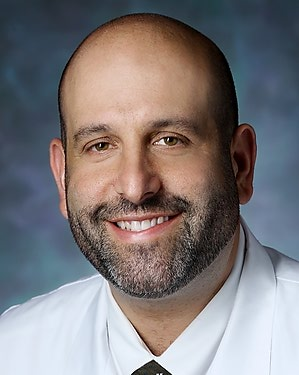Research Lab Results
-
Lisa Yanek Lab
Research in the Lisa Yanek Lab focuses on cardiovascular disease in families and risk factor modification. Recently, we conducted a study to determine the association of lean versus fat mass with fitness in healthy, overweight and obese African Americans from families with early-onset coronary disease.
-
Liudmila Cebotaru Lab
Research in the Liudmila Cebotaru Lab studies cystic fibrosis transmembrane conductance regulator (CFTR) mutants. We also investigate corrector molecules that are currently in clinical trials to get a better understanding of their mechanism of action. A major focus of our research is on developing more efficient gene therapy vectors with the ultimate goal of developing a gene therapy for cystic fibrosis.
-
Livia Casciola-Rosen Lab
Work in the Livia Casciola-Rosen Lab explores the shared mechanisms present in autoimmune rheumatic diseases, specifically scleroderma, Sjogren's syndrome and myositis. We use disease-specific autoantibodies to identify the factors that cause the autoimmune response in such diseases. Our current research involves identifying the antigen targets of autoimmune diseases, investigating the autoantigens targeted in cancers associated with rheumatic diseases and finding unique clinical biomarkers, such as the anti-HMGCR antibody specificity.
-
Lonny Yarmus Lab
Clinical trials conducted in the Lonny Yarmus Lab focus primarily on minimally-invasive diagnostic testing for patients with lung cancer and local therapy options for malignant airway obstructions. We investigate ways to improve the early diagnosis of lung cancer, as well as the treatment of later-stage cancer, using the least invasive methods possible. We are also part of the LIBERATE clinical study for patients who have difficulty breathing and suffer from severe emphysema.
-
Loyal Goff Laboratory
The Loyal Goff Laboratory seeks to answer a fundamental biological question: How is the genome properly interpreted to coordinate the diversity of cell types observed during neuronal development? We are focused on the acquisition of specific cellular identities in neuronal development and identifying the molecular determinants responsible for proper brain development. Using novel experimental approaches for the enrichment and purification of specific neuronal cell types and recent technological advances in single-cell RNA sequencing, we can discover and explore the cellular factors that contribute to neuronal cell fate decisions during mammalian brain development. -
Lynette Mark Lab
The Lynette Mark Lab primarily studies topics within the field of anesthesiology. Our team also researches various aspects of patient safety, including best practices for patient safety reporting systems.
-
Machine Biointerface Lab
Dr. Fridman's research group invents and develops bioelectronics for Neuroengineering and Medical Instrumentation applications. We develop innovative medical technology and we also conduct the necessary biological studies to understand how the technology could be effective and safe for people. Our lab is currently focused on developing the ""Safe Direct Current Stimulation"" technology, or SDCS. Unlike the currently available commercial neural prosthetic devices, such as cochlear implants, pacemakers, or Parkinson's deep brain stimulators that can only excite neurons, SDCS can excite, inhibit, and even sensitize them to input. This new technology opens a door to a wide range of applications that we are currently exploring along with device development: e.g. peripheral nerve stimulation for suppressing neuropathic pain, vestibular nerve stimulation to correct balance disorders, vagal nerve stimulation to suppress an asthma attack, and a host of other neuroprosthetic applications. Medical Instrumentation MouthLab is a ""tricorder"" device that we invented here in the Machine Biointerface Lab. The device currently obtains all vital signs within 60s: Pulse rate, breathing rate, temperature, blood pressure, blood oxygen saturation, electrocardiogram, and FEV1 (lung function) measurement. Because the device is in the mouth, it has access to saliva and to breath and we are focused now on expanding its capability to obtaining measures of dehydration and biomarkers that could be indicative of a wide range of internal disorders ranging from stress to kidney failure and even lung cancer. -
Mahendra Damarla Lab
Work in the Mahendra Damarla Lab focuses primarily on the field of vascular biology. Much of our research involves exploring alternatives to mechanical ventilation as a therapy for acute lung injury. We investigate mitogen-activated protein kinase-activated protein kinase 2 as a method to mediate apoptosis during lung vascular permeability by regulating movement of cleaved caspase 3. We have also conducted research on the prevalence of confirmatory tests in patients hospitalized with congestive heart failure or chronic obstructive pulmonary disease (COPD).
-
Maqbool Dada Lab
The Maqbool Dada Lab studies operations management, supply chain management and pricing models. Our team has investigated topics such as financial risk in the Medicare prospective payment system and sourcing decisions under capacity reservation agreements. Our current research includes exploring customer-based tradeoffs in service facility design.
-
Marcia Canto Lab
Research interests in the Marcia Canto Lab include pancreatic neoplasms, Barrett’s esophagus and endomicroscopy. We are also interested in the use of endoscopic ultrasound to identify early-stage pancreatic cancer and its precursors.


